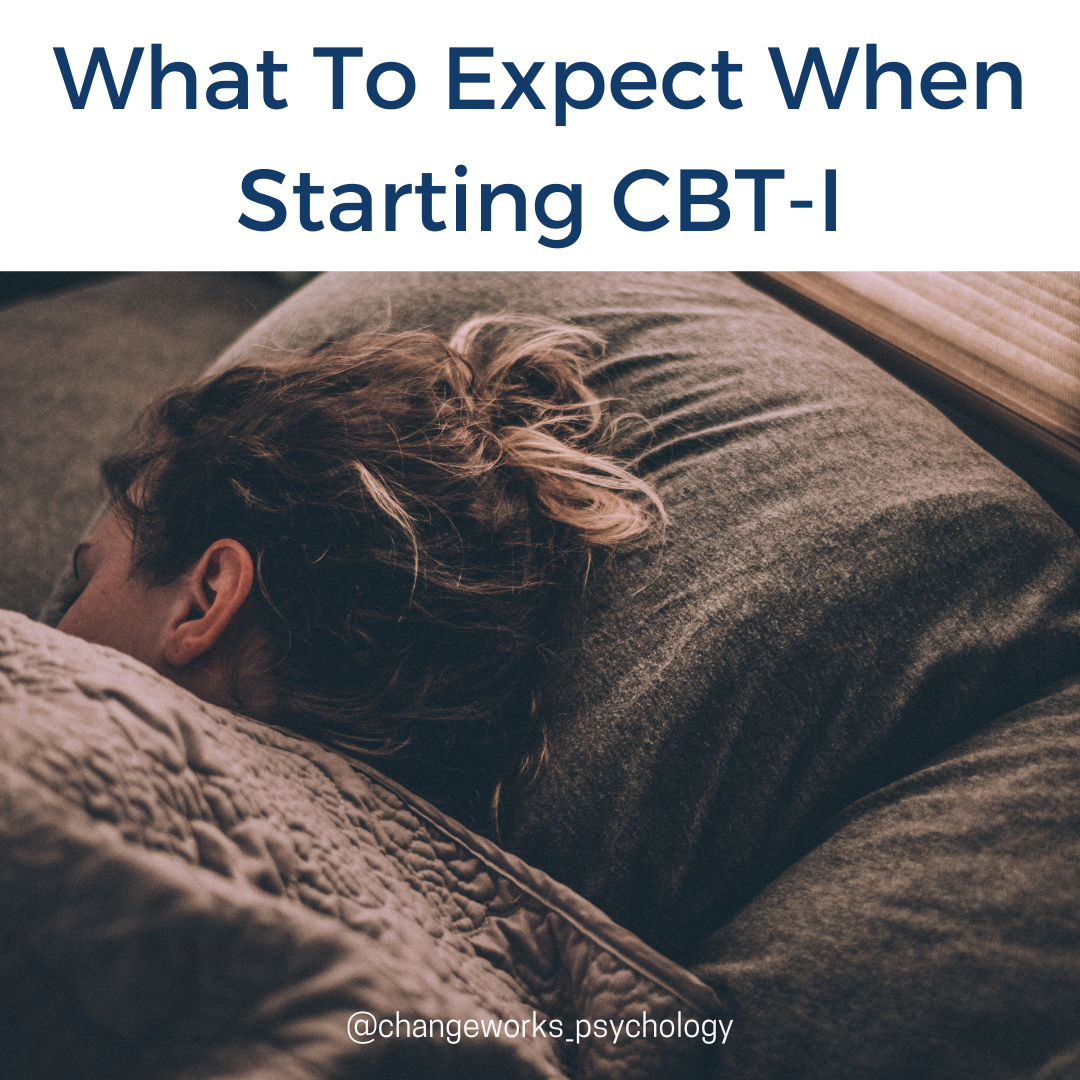What To Expect When Starting CBT-I

Cognitive Behavioral Therapy for Insomnia (CBT-I) is a highly effective treatment for chronic insomnia. It is a type of talk therapy that aims to identify and modify negative thoughts and behaviors that contribute to insomnia.
What I love about CBT-I is that unlike other therapeutic models, this one is short, highly structured, and evidence based, so you don’t have to wait forever to get results and direct advice on how to improve your sleep.
The majority of people respond to this treatment within 4-6 sessions, and some experience significant change after only 2 sessions. CBT-I is the most effective non pharmacological treatment for insomnia, and without all of the side-effects that sleep medications are known for.
Here’s what you can expect when starting CBT-I:
Evaluation:
We will discuss your lifestyle, sleep hygiene habits, and any other factors that may be contributing to your insomnia. I’ll also ask you to keep a sleep diary to track your sleep patterns. One of my FAVORITE things about CBT-I is that it’s evidence based AND it allows us to customize the treatment to you and wherever you’re at.
Education:
Understanding why I’m asking you to do certain things is important, especially when some of the recommendations don’t seem that fun. I’ll teach you about the principles of good sleep hygiene, why they are so important and why they work, and how to implement them in your daily life. I may also teach you relaxation techniques and other strategies to reduce stress and anxiety and encourage better sleep, which are proven by research to reduce cortisol, adrenaline, and other stress hormones.
Sleep Restriction:
Ok, I HATE this term. (I prefer to call it sleep optimization, but I didn’t develop it so I’ll defer to the experts.) One of the main components of CBT-I is sleep restriction therapy, which involves limiting the amount of time you spend in bed to increase your sleep drive. I know, I know… I frequently hear, I need more sleep and you are asking me to limit my time in bed?!
This part requires a bit of trust in the process, but don’t worry, we can baby step this. Initially, you will be given a strict bedtime and wake-up time, and you will only be allowed to spend the amount of time in bed that corresponds to the amount of time you typically sleep. Over time, we’ll adjust your bedtime and wake-up time based on your progress (We all know that change isn’t always instantaneous!)
Stimulus Control:
Another component of CBT-I is stimulus control therapy, which involves breaking the association between your bed and wakefulness. This means that you will be encouraged to only use your bed for sleeping and sex, and to avoid doing other activities, such as watching TV, using your phone, or working in bed.
When we do these things in bed, what we’re doing is interfering with the association between your bed and a restful mental state and sleep. Particularly when people do very mentally stimulating things in their bed or bedroom, such as looking at their bright phone screen or doom scrolling on Instagram, it stops the bed from being a cue for the body and mind to wind down.
This also helps strengthen your circadian rhythm which is your natural sleep and wakefulness cycle.
Cognitive Therapy:
Cognitive therapy involves identifying and modifying negative thoughts and beliefs that contribute to insomnia. I’ll help you identify these thoughts and teach you strategies to challenge and replace those thoughts with more positive (helpful) ones.
Follow-Up:
I’ll monitor your progress and adjust your treatment plan as needed. You may also be asked to continue keeping a sleep diary to track your progress.
It’s important to note that CBT-I can be challenging at first, and it may take several weeks to see significant improvements in your sleep. You may experience some discomfort and frustration as you adjust to the new sleep schedule and habits. However, with perseverance and dedication, CBT-I can help you overcome chronic insomnia and improve your overall quality of life.
If you’d like to learn more about CBT-I and if you are a good candidate, please reach out for free consultation.
I offer individual online therapy for insomnia and am trained as a certified mindfulness-based stress reduction teacher. Mindfulness techniques can help you learn how to manage anxiety and stress through creating more of an understanding of the emotions within the body and can help you get more in touch with your values and needs, and less anxiety and less stress equates to more sleep.
I am a Licensed Clinical Psychologist trained in CBT-I and I work with clients in the United Kingdom, United States, or elsewhere in the world. So, if you’re looking for a counselor in Chicago (or almost anywhere in the United States or the world) and are interested in learning more about how I could help you, please don’t hesitate to contact me.

